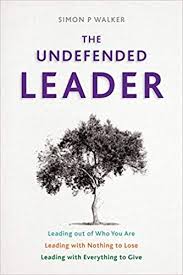
For instance, we learn from Brene Brown1 and Manfred F.R. Kets de Vries2 that daring leadership requires empathy, that effective leadership require transparency and self-compassion. Contra Brown, Edwin Friedman’s Failure of Nerve tells us not to engage in empathy. In fact, he devotes a whole chapter decrying the potential pitfalls of this, putting it on the same level as ‘emotional coercion.’3 Then there are the joys of discovering that some of these experts agree, i.e., Kets de Vries’ ‘accepting our shadowy side’ with Simon Walker’s ‘leading out of who you are’ which aptly is the title of the first volume of his 3-part series on The Undefended Leader.
As I’m writing this, I’ve yet to decide exactly what direction to take this since there is so so much to unpack. Do I write about the need for leadership in these turbulent times? Do I pick something more aligned with my dissertation? Or do I wax about the alphabet (PSC, RSC, PSX, etc.) soup of leadership concepts Walker theorizes are the ways we understand leadership? After giving it some thought, I decided to write about what the reading has caused me to reflect on the most — and it’s this: What is the goal of leadership?
My own understanding of the goals of leadership had always been tied directly to the organization’s mission (ideal) and vision. Purportedly we apply all our skills and resources to accomplish the mission and vision. The mission is grand, once for all, and the vision is what gets us there. While there’s a lot of wisdom in that, I felt, after reading Walker, that perhaps that view was too simplistic and runs the risk of becoming too ethereal for followers to follow.
Having worked at Biola University for over a quarter of a century (I know, that’s a very long time), I find that most of its employees, to my dismay cannot recall, much less utter the mission statement that is frequently promoted in internal memos, missives, ads, campaigns, etc. Biola is proud of its 111 year heritage and makes every effort to let the world know that our mission statement remains unchanged since its founding. And yet I feel our staff, faculty and students do not mention it nearly enough about this being a reason for belonging to an institution as much as I do. Does this make me a leader—because I care so much about this?
Walker admonishes the leader about feeling trapped in ‘idealism.’ It’s one of the things that drives leaders. In my case, it has become foundational in all I do as a leader and has become indistinguishable from the mission. The danger in this, according to Walker is when a leader looks at the ideal and discovers that the world does not conform to it, a cognitive dissonance develops in the mind which may lead to mental and emotional stress.4
Is the goal of leadership success? Success in accomplishing projects, meeting enrollment goals, staying within budget, etc.? Sure, but these all could be attained by formulas and technique; things delegable. Walker offers something better. He writes “that the only proper goal of leadership is this: to enable people to take responsibility.”5 That’s it.
Up until this point I had not considered some of the possible ways to frame my understanding of leadership. I had always thought leadership was based on a single dimension of skill, charisma or vision. Walker has provided a way to lay foundations to which I can build my own set of leadership concepts that work in my present context. As I’ve mentioned, there is so much to absorb in these three books that I’m glad this is the last reading of this sort for this semester because I will now have the chance to ruminate on what it means to enable people to take responsibility.
- Brené Brown, Dare to Lead: Brave Work, Tough Conversations, Whole Hearts (New York: Random House, 2018), p.80
- Manfred F. R. Kets de Vries, Down the Rabbit Hole of Leadership: Leadership Pathology in Everyday Life (Cham, Switzerland: Palgrave Macmillan, 2019), p.Kindle, Loc. 2130)
- Edwin H. Friedman, Margaret M. Treadwell, and Edward W. Beal, A Failure of Nerve: Leadership in the Age of the Quick Fix (New York, NY: Seabury Books, 2007), Kindle, Loc. 2380.
- Simon P. Walker, Leading out of Who You Are: Discovering the Secret of Undefended Leadership (Carlisle: Piquant, 2007), Kindle, Loc. 363.
- Ibid., Loc. 2629.






